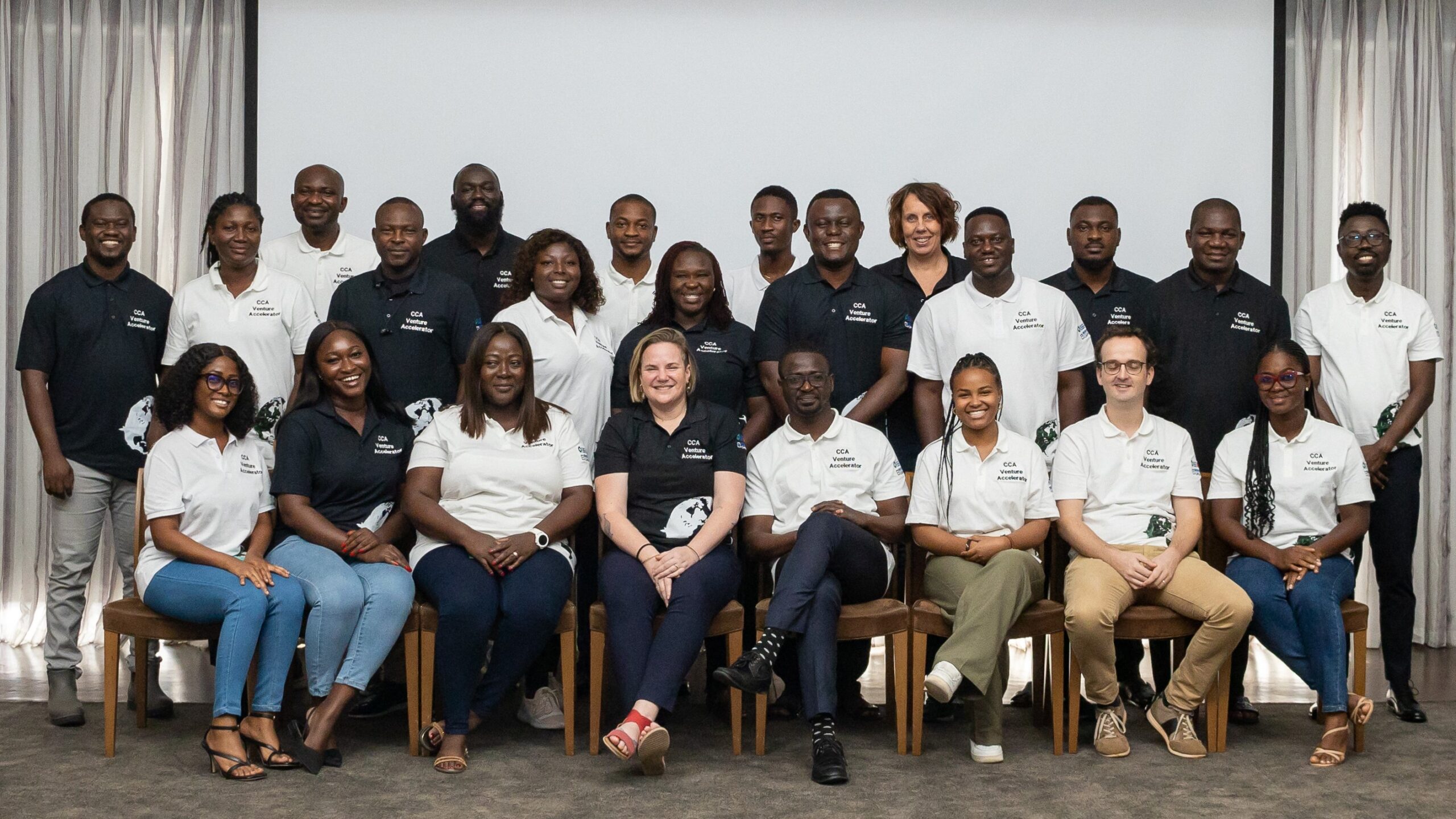Inaugural CCA Venture Accelerator Launches with 8 West African Enterprises
ACCRA, Ghana, Nov. 22, 2023 — The Clean Cooking Alliance (CCA) has launched its Venture Accelerator program, with the inaugural cohort focused on carbon finance in West Africa. The program, with support from APA Corporation, aims to nurture early-stage clean cooking ventures and help them scale up.
Clean cooking only receives about 1% of the estimated $10 billion per year required to achieve universal access by 2030. The sector needs a much greater infusion of capital to significantly expand, and more clean cooking companies must receive investments that specifically target climate and energy access.

CCA seeks to build a pipeline of clean cooking companies attractive to investors and to drive more capital into the sector. To do this, CCA’s Venture Accelerator program provides small- and medium-sized clean cooking companies with business development support, tailored technical assistance, and access to investment opportunities, thereby helping these companies build their capacity and preparedness to attract carbon finance. More broadly, the Venture Accelerator is simultaneously supporting ecosystem efforts to build Africa’s participation in carbon markets.
[ Learn more about the Venture Accelerator. ]
CCA aims to strengthen the clean cooking sector by catalizing financial commitments of at least $100 million by 2026 and $500 million by 2030, lowering the barriers that clean cooking companies face when entering carbon markets and accelerating peoples’ and countries’ transitions to cleaner cooking solutions. The Venture Accelerator program is one initiative to help the sector reach these goals.
The program kicked off with an in-person bootcamp in Accra, Ghana from November 13-17, featuring curated sessions by CCA’s program partners: Innohub and Mirepa Capital (implementation partners), Hamerkop (technical partner), and Value for Women. The bootcamp culminated with a networking event for clean cooking and carbon market players in Ghana, including representatives from the Ghana Carbon Markets Office and the Ministry of Energy.
“Participating in the Venture Accelerator program will enable us to build critical relationships that can be leveraged in the future as we expand our network through the circle of professionals the program will provide,” said Kamal-Deen Kassim, CEO of Hinata Energy.
“Vitalite has high expectations from the Accelerator and is looking forward to scaling up in clean cooking to make it accessible and affordable to all,” said Frederique Sheridan, CEO of Vitalite.
The first cohort comprised eight West African enterprises from Ghana, Nigeria, Sierra Leone, and Senegal seeking to attract carbon finance as a source of growth capital. The companies include:
Easy Solar (Sierra Leone): Easy Solar’s vision is to make energy, financial services, and life-improving products affordable and accessible for all. Founded in 2016, the company focuses on under-banked, offline, and hard-to-reach West African consumers for whom access to credit and quality goods remains extremely limited, preventing them from investing in products that can help them improve their living conditions and generate additional income.
Hinata Energy (Nigeria): Hinata is a renewable energy enterprise with a core business in the retail of affordable and safe biofuel and biofuel-powered cookstoves. Hinata targets communities that rely on polluting fuels for cooking, thereby reducing threats to health and the environment.
Jacgk Trust (Ghana): Jacgk Trust takes pride in reducing carbon emissions through the production of high quality, safe, and clean cookstoves and extending access to clean cooking to various communities in Ghana.
Nasam Brand Enterprise (Ghana): Nasam Brand designs and manufactures improved cookstoves including for charcoal, wood, LPG, and biogas, for urban and rural households in Ghana. The organization plays a significant role advocating for clean cooking, including by participating as a board member with the National Clean Cooking Alliance in Ghana.
Nenu Engineering (Nigeria): Nenu Engineering develops and manufactures highly improved cookstoves that reduce both toxic smoke emission and firewood consumption.
Roshan Renewable Technologies (Nigeria): Roshan works to bring access to clean cooking and lighting to underserved communities and to improve the economic situation of rural women.
Sustainable Energies Technology Ltd (SETECH) (Ghana): SETECH is a social enterprise that designs, produces, and sells innovative, climate-smart renewable energy solutions. SETECH contributes to sustainable development by focusing on advanced clean cooking technologies for households and women-dominated agro-industries in rural and peri-urban communities.
Vitalite (Senegal): Vitalite’s mission is to make high-quality, sustainable, “green energy” products and personalized services (e.g., rent-to-own or financial inclusion schemes) available and accessible, to improve our customers’ lives. The company started distributing solar home systems in 2015 and has recently added prefabricated biodigesters to its product offerings.
“CCA and its partners have set out to design a program that will assist clean cooking enterprises to identify the right pathway for them to participate in the carbon markets and understand the opportunities and risks that these markets hold,” said Simbarashe Mudimbu, Senior Manager for Market Strengthening at CCA. “We trust that this program will be of immense value to aspiring carbon project developers in the sector and support the critical work of making clean cooking solutions available to all.
